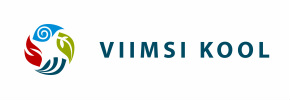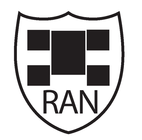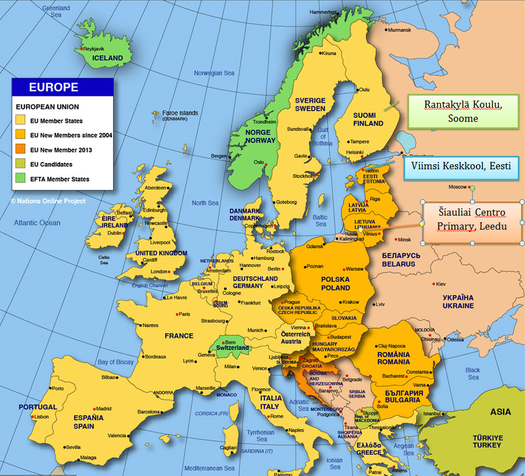The international project "Be active. Stay healthy!"
Being physically active is one of the most important steps to being healthy. Schools are an ideal setting for teaching youth how to adopt and maintain a healthy, active lifestyle. The main goal of the project is about the promotion of sustainable healthy life and well-being of children and youth in the school context: promoting active life style, safety, positive attitude and co-operation in everyday school life, participation and involvement as well as strengthening the community involvement and participation. The purpose of the project is to develop and improve pedagogic and didactic methods and to compile a collection of supplementary material for class teachers as well as finding new methods of inspiring pupils to experience different and exciting sports and activities.
The project is carried out between three countries - Estonia, Lithuania and Finland. The target group of the project is the primary level in all three schools, which means students between the age of 6 -13. We want to promote active way of life and enable students to enjoy every school day.
Being physically active is one of the most important steps to being healthy. Schools are an ideal setting for teaching youth how to adopt and maintain a healthy, active lifestyle. The main goal of the project is about the promotion of sustainable healthy life and well-being of children and youth in the school context: promoting active life style, safety, positive attitude and co-operation in everyday school life, participation and involvement as well as strengthening the community involvement and participation. The purpose of the project is to develop and improve pedagogic and didactic methods and to compile a collection of supplementary material for class teachers as well as finding new methods of inspiring pupils to experience different and exciting sports and activities.
The project is carried out between three countries - Estonia, Lithuania and Finland. The target group of the project is the primary level in all three schools, which means students between the age of 6 -13. We want to promote active way of life and enable students to enjoy every school day.

Viimsi Commune is a rural municipality in Northern Estonia. Neighbouring the capital Tallinn, it is the most populous rural municipality in Harju County. Due to the fact that the population is rapidly increasing, our school is faced with many challenges in order to preserve the identity of our own community. The quality of education and the values offered in Viimsi are to generate the feeling of identity and unite the inhabitants.
Viimsi Secondary School is not only a learning centre, but also the centre of the social life of the municipality. Our vision is to be an open learning environment with equal opportunities for all round development of students. In order to create the best conditions for becoming excellent members of society we offer inspiring, harmonious development and learning environment for all students wishing to acquire basic and secondary education in our school.
Viimsi Secondary School is not only a learning centre, but also the centre of the social life of the municipality. Our vision is to be an open learning environment with equal opportunities for all round development of students. In order to create the best conditions for becoming excellent members of society we offer inspiring, harmonious development and learning environment for all students wishing to acquire basic and secondary education in our school.

Rantakylä School is situated in the Eastern Part of Finland town called Joensuu. There are about 70 000 inhabitants living in Joensuu. Our Rantakylä School is situated three kilometers from the city center. This Rantakylä area is quite poor with all kinds of problems like unemployment, single parenthood, immigrants etc.
There are about 385 pupils and amount of our staff 45 (30 teachers and 15 school assistants /special needs assistants). Our School has about 15 different nationalities of pupils and four of our staff. Our school is for the pupils for from 5 to 13 years old including special needs classes and immigration education groups. From Autumn 2013 our School has functioned in two different school buildings one kilometer from each other. In one building there are classes 0 - 4 and children at the ages 5 - 11. In the other building there are classes 5 - 6 at the ages 10 - 13.
We find international education very important for all to get the same opportunity to widen their knowledge of languages and different cultures.
There are about 385 pupils and amount of our staff 45 (30 teachers and 15 school assistants /special needs assistants). Our School has about 15 different nationalities of pupils and four of our staff. Our school is for the pupils for from 5 to 13 years old including special needs classes and immigration education groups. From Autumn 2013 our School has functioned in two different school buildings one kilometer from each other. In one building there are classes 0 - 4 and children at the ages 5 - 11. In the other building there are classes 5 - 6 at the ages 10 - 13.
We find international education very important for all to get the same opportunity to widen their knowledge of languages and different cultures.

Šiauliai Centro Primary school is a small school in the center of the city. It was found in 1993. This year the school will celebrate its twentieth anniversary. There are 220 pupils aged 6 – 11 and 20 teachers. The school has got a pre – school group and 10 primary school classes.
Centro Primary School is a public school, owned by the Municipality of Šiauliai. It follows the National School Plan and curriculum, but School is specific because of two systems functioning in it . Seven classes work following so called "step by step" program, which is focused on child centered education and other half of school works in so called "traditional" way which is based much more on academic things.
It is school in the city centre and represents families of urban region. There is strong school community – high level of cooperation between teachers and families. Parents are involved in school projects and making decissions about school developement. Important part of school life – social partners – Siauliai University, Centre for innovative education, centre of education developement, nursery schools, neighbourhood primary and secondary schools. Traditionaly there is exchange exhibitions, performances and concerts between our school and kindergartens. During The Soviet period Siauliai was closed city because of one of the biggest military air – force bases. So now, we have very solid cultural, national and racial background. Like in other countries there is very high level of emigration in Lithuania. It has influence to our school too. There are psychological social and academic problems with children from families, were parents work abroad and children must live with grandparents or other relatives.
Centro Primary School is a public school, owned by the Municipality of Šiauliai. It follows the National School Plan and curriculum, but School is specific because of two systems functioning in it . Seven classes work following so called "step by step" program, which is focused on child centered education and other half of school works in so called "traditional" way which is based much more on academic things.
It is school in the city centre and represents families of urban region. There is strong school community – high level of cooperation between teachers and families. Parents are involved in school projects and making decissions about school developement. Important part of school life – social partners – Siauliai University, Centre for innovative education, centre of education developement, nursery schools, neighbourhood primary and secondary schools. Traditionaly there is exchange exhibitions, performances and concerts between our school and kindergartens. During The Soviet period Siauliai was closed city because of one of the biggest military air – force bases. So now, we have very solid cultural, national and racial background. Like in other countries there is very high level of emigration in Lithuania. It has influence to our school too. There are psychological social and academic problems with children from families, were parents work abroad and children must live with grandparents or other relatives.

This project has been funded with support from the Nordplus programme

